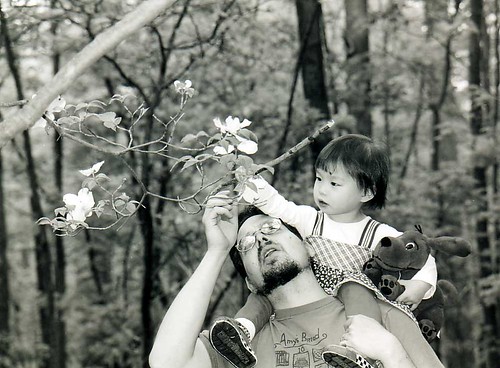|
|
Thursday, May first, 2008
 I totally forgot to note the passing of another year blogging, which happened last Friday. I have been keeping this journal for 5 years, now! (At roughly I totally forgot to note the passing of another year blogging, which happened last Friday. I have been keeping this journal for 5 years, now! (At roughly 240235 posts/year.*) That is a long time.
I feel like writing some reminiscences of starting this journal, but not right now. Maybe on the weekend I will. (In the meantime, here is an early post about my motivations in starting a blog.)
 *Forgot: the id number of the latest post is not quite the same as the number of posts, since there have been a couple of deletions here and there. (It's very front-loaded though: in the first four years the average number of posts is 176, in the fifth year there are 473 posts. I wonder what the sixth year will bring?)
posted morning of May first, 2008: Respond
➳ More posts about The site
|  |
|
 Oh boy, another month! This one is going to be the month of my birthday and the month when our garden really starts looking garden-y. (April hasn't been too bad -- some nice flowers -- but in May you start getting the lush greenery, the azaleas and the mountain laurel are going to come out in force, I need to start mowing the lawn.) Oh boy, another month! This one is going to be the month of my birthday and the month when our garden really starts looking garden-y. (April hasn't been too bad -- some nice flowers -- but in May you start getting the lush greenery, the azaleas and the mountain laurel are going to come out in force, I need to start mowing the lawn.)
posted morning of May first, 2008: Respond
➳ More posts about The garden
|  |
Tuesday, April 29th, 2008
I wrote in comments to Dr. Waterman's post at The Great Whatsit, that the first two stanzas of "To Brooklyn Bridge" had me anticipating a story -- maybe I should try and explain what I mean.  How many dawns, chill from his rippling rest
The seagull's wings shall dip and pivot him,
Shedding white rings of tumult, building high
Over the chained bay waters Liberty --
Then, with inviolate cure, forsake our eyes
As apparitional as sails that cross
Some page of figures to be filed away;
-- Till elevators drop us from our day... So: You see the seagull flying across the bay in the dawn in the first stanza -- and I think this stanza is really the most beautiful bit of the poem -- and the second gives a feeling of dropping, as if we are taking our eyes from the gull to look at the events below it. Great! We're going to have a poem describing some events on the lower Manhattan waterfront! But no; the lens never focuses after it leaves the gull. That's my complaint. "Till elevators drop us from our day" totally makes me think, "Till human voices wake us, and we drown."
 Update: Waterman suggests that at least some of the images in subsequent stanzas could be interpreted as transformations of (or references to) the seagull. This is an interesting idea.
posted evening of April 29th, 2008: Respond
➳ More posts about Readings
|  |
|
The University of Utah press will be publishing Autobiographies of Orhan Pamuk: the Writer in his Novels, by Michael McGaha, in July. It purports to be "the first book-length study of the life and writings of Pamuk", a claim which is born out by the searching I've been doing online. So, exciting! Can't wait! It is an excellent, promising title for a book about Pamuk's novels.
posted morning of April 29th, 2008: Respond
➳ More posts about Orhan Pamuk
|  |
Monday, April 28th, 2008
Go take a look at the test composition and grading method that heebie-geebie is describing, "Tiered Testing" -- it seems to me like it makes a lot of sense.
posted evening of April 28th, 2008: Respond
|  |
Well, Lush Life is seeming (⅓ of the way in) like it's not as good as I remember Freedomland being. It's a fun book, and exciting, but it doesn't really bear thinking about -- like I'm enjoying the read as long as I'm not thinking about what I'm reading. It's reminding me a lot of NYPD Blue, in that way. So, no posts about this book, I'm just going to read it without the reflection.
posted evening of April 28th, 2008: Respond
➳ More posts about Lush Life
|  |
Sunday, April 27th, 2008
I'm taking a little break from the heavy European lit to read Richard Price's Lush Life. Ellen's been really enjoying it and she just finished, I'm going to dive in tonight. We've read Clockers and Freedomland previously and enjoyed them both -- if memory serves I thought Freedomland was by far the better of the two so I've got my fingers crossed that the upward trend will continue with his latest.
posted evening of April 27th, 2008: Respond
|  |
Friday, April 25th, 2008
Many thanks, to whomever it was that recommended The Man Without a Past to me! I have forgotten who you were and in what forum you made the recommendation, though something tells me it was in a blog post. Ellen and I loved the movie and are wondering if the soundtrack is available.
 ...Yep, it's just a click away.
posted evening of April 25th, 2008: Respond
➳ More posts about The Movies
|  |
Thursday, April 24th, 2008
 Ellen and Sylvia are back home from their D.C. vacation -- they had a good trip and took plenty of pictures. Ellen and Sylvia are back home from their D.C. vacation -- they had a good trip and took plenty of pictures.
Sylvia was play-acting this afternoon and I found this snippet pretty amusing: I'm an eagle!... I'm soaring... across the ground... While she was away, Sylvia finished Further Adventures of the Great Brain, and got about halfway through Prince Caspian. (Odd combination, a little -- she has been really wrapped up in the Great Brain books lately, and she wanted to reread Caspian before the film comes out.) I'm so proud!
posted evening of April 24th, 2008: Respond
➳ More posts about The Chronicles of Narnia
|  |
Wednesday, April 23rd, 2008
But Galip is insane.
--The Modesto Kid
(I'm stretching, stretching these last two chapters of the Black Book because I just don't want the story to end!)
I've become very attached to the following reading of the events portrayed in The Black Book. It seems like it might be susceptible to an Occam's Razor argument. - In Chapter 19 ("Signs of the City"), Galip goes insane.
- The second half of the book takes place in a different reality than the first; that is to say, Galip's insanity has the effect of moving him into a different world. What is happening in the old reality of the first half is not really germane to the discussion.
I'm not sure what this gets me -- I don't want to say, the events described in the second half of the book are the flow of our reality, because they seem so rooted in paranoia; and I also don't want to say, they are Galip's fevered hallucinations as he lies on a hospital bed in "the reality outside the story", because that seems banal to me.

Later, when he himself went over to Aunt Hâle's, he looked at the great purple flowers on her dress and saw that they were printed on a background that was the exact same shade of pistachio green. Was this a coincidence, or the strange leftover from thirty-five years ago, or a reminder that this world, like the gardens of memory, still shimmered with magic? Pamuk's interjection in the last chapter ("But I Who Write") is a stroke of genius. We the readers are allowed, encouraged, to privilege our own readings of the novel's events over what the author intended. This passage moves me to tears: That night, Galip saw Rüya among the baby dolls in Alâaddin's shop. She had not yet died. Like the dolls around her, she was blinking and she was breathing, but only just; she was waiting for Galip, but he was late; he just couldn't manage to get there; he just stood there at his window in the City-of-Hearts Apartments, staring at Alâaddin's shop in the distance, watching the light stream from its window onto the snow-covered pavement as tears rolled from his eyes.
posted evening of April 23rd, 2008: Respond
➳ More posts about The Black Book
| Previous posts
Archives  | |
|
Drop me a line! or, sign my Guestbook.
•
Check out Ellen's writing at Patch.com.
| |

